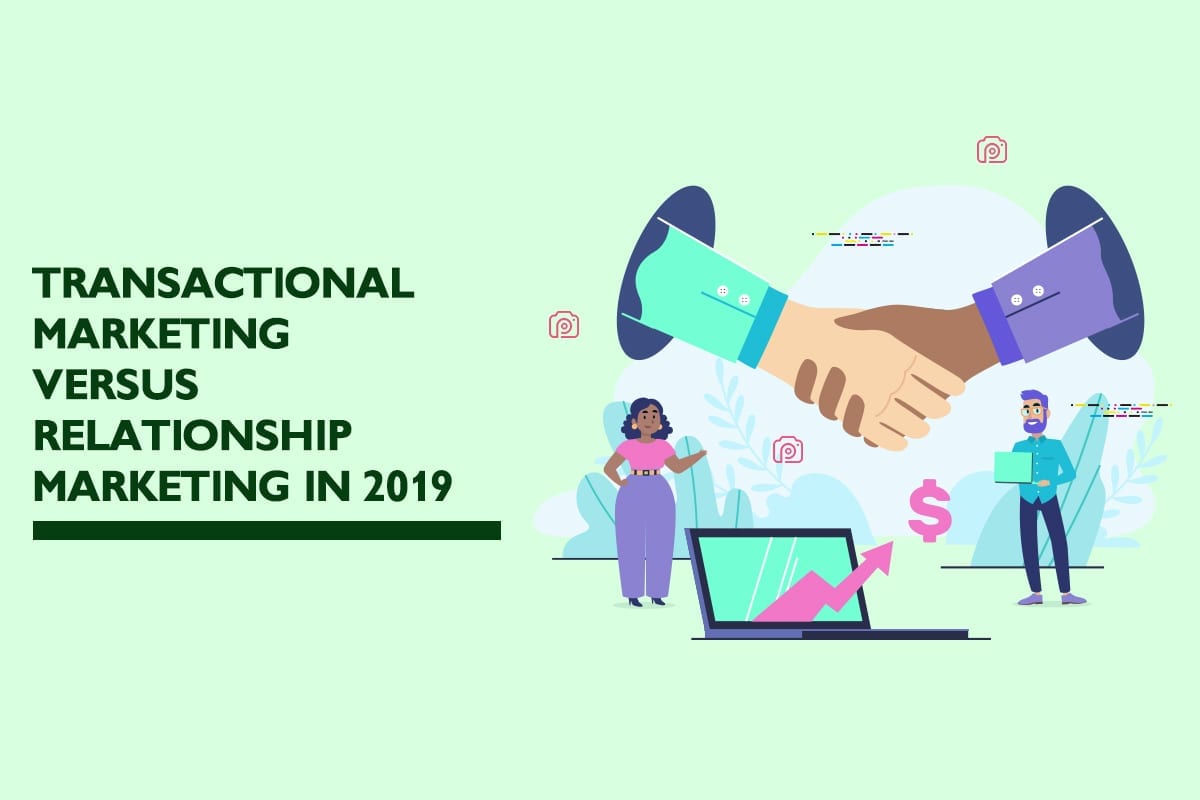- Telegram : t.me/pinc360
- Telegram : t.me/pinc360
- Branding and Marketing
- Jul 11
Transactional marketing vs. relationship marketing in 2019

Every business needs a form of CRM, placing an emphasis on generating customer loyalty and forging solid emotion centric customer connections for a brand that can yield ongoing business, free word-of-mouth promotion and data feedback from customers who can potentially generate leads. But one potential downside to this is purely relational marketing alone may be insufficient to close a sale. On the other hand, lies transactional marketing. Which as its namesake implies, is all about maximising volume and efficiency of each individual sale rather than generating a relationship of any kind. However, it’s aggressive nature could end up alienating customers, leaving you two steps behind.
While it is logical to assume that relational marketing is the more adopted practice, there also lies a need for transactional marketing when it comes to actually closing the sale. So is one approach any better than the other? Let’s find out.
Relational marketing
The essence of relational marketing enhancing brand loyalty through customer interactions, with the creation of this business and customer (B2C) relationship being the catalyst for generating loyalty and acquiring returning customers. There are a few advantages to relational marketing, with the first being:
Significant ROI
It is easier to work with the customers you have retained over the years than have to start from scratch; because recruiting new customers is costly and time-consuming. I.e the repeat sales generated from your existing customers are far greater than the returns generated from recruiting new customers.
“Relational marketing increases customer retention rates by 5% and increases profits from 25 percent to 95 percent” – Reichheld & Schefter
Moreover, new customers become more valuable, therefore any marketing campaigns launched to attract new customers would see an even greater increase in returns.
Positive reviews and feedback
Word travels far about your business, by keeping your customers happy, you ensure that only pleasant things are said and heard about you. That way, a snowball effect occurs and you attract more and more customers; either through reviews or word of mouth.
What’s more, customer feedback is one of the most valuable assets you can have. When you have a relationship with your customers, they are more likely to share their opinions with you once you’ve built that level of trust with them. If you lend them an ear about their experience with your business, they are more motivated to tell you all the opportunities they see where you could improve your product or service.
Concerns
One of the drawbacks of relationship marketing is its risks and financial costs. Implementing customer service can become costly really quick, and not only that, not all of your promotions are guaranteed to pique customer interest; if your promotions fall flat, then it would have been a wasteful expenditure. Another aforementioned concern is that relationship marketing alone is insufficient to close a sale; while it may ensure that a customer will always have your brand in mind, it may not guarantee a sale if a better alternative shows itself.
Transactional marketing
On the other spectrum, lies transactional marketing. Its focus is mainly on the actual sales process of an item, and it’s premise revolves around maximizing the volume and efficiency of individual sales and is generally perceived as the ‘less consumer-friendly’ approach among the two practices. However, transactional marketing does have its merits, and here are a few examples:
Improved inventory turnover
Inventory consumes valuable space and can be difficult to manage. Transactional marketing facilitates the process of getting inventory out the door more quickly. An application of this is the flash sales of seasonal items that are yet to be sold. By clearing out discounted items, you leave more space for in-demand items, allowing you to generate more revenue.
Significantly lower costs
Instead of brand messages, this practice is driven solely by price incentives. When compared to launching a marketing campaign, the promotional costs are significantly lower than developing a long term branding campaign. In this context, communication is simple and on tap – inform customers of the price reduction through in-house signage and external messaging.
When developing a branding campaign, you also have to include the design, development and distribution of said message.
Reduced emotional attachment
Customers would be less emotionally committed or attached to the end product. When the price is their main priority, customers will not be as concerned with the quality and service expected by more discerning customers. They will only be attached to you as long as the promotion runs, or until they seek out a better alternative.
Concerns
Although the volume of sales will be significantly higher, there may be a reduction in terms of gross profit margin – the difference between your revenue and costs of goods sold, due to the fact that your product is marketed at a significant discount e.g. 50 percent off 10 USD, meaning that only 5 USD is obtained from each sale. While volume is likely increased, the actual gross profit per transaction could be at zero percent. There is also the issue of little to no reputation-building due to the quick turnover of transactions, meaning that no positive reviews are left, and your brand is deprived of the opportunity to build a reputation within the community. Therefore, creating a more restricted and passive relationship, meaning that customers are only aware of your business only when there is a promotion or sale, and their awareness does not go beyond that.
In a nutshell…
While the digital age has become one where consumers are more privy towards the sales and marketing tactics of a brand; prompting brands to engage in a more interpersonal manner of communication, it can be said that the practice of relational marketing has become more commonplace than ever – especially in a time where consumers are equipped with more information than before, is now regarded as standard practice in many industries.
However, the merits of transactional marketing should not be overlooked. Despite lacking the ‘human’ qualities relationship marketing possesses, the practical aspects of transactional marketing can be perceived more as a ‘behind the scenes’ practice, whereby transactions can be facilitated more readily. Ultimately, both approaches possess merits that aid marketing processes and should be used in tandem with one another.
Speak with us here and let us help you determine what works best for you!
Related Posts

Three amazing social media campaign ideas and why they worked
As a marketer, social media campaigns are one of a few great ways to promote your brand or market your product or services. It’s for the best that you keep your social media content postings…
- May 16

Noteworthy Valentine’s Day Campaigns for 2021
A day where guys burn their savings like a bullet train and girls sharing about their unique Valentine date experiences on social media, Valentine’s Day is celebrated both on a personal and a corporate level….
Basket
Product categories
- Agency (10)
- Platform (26)
- Digital and Social Media (12)
- Lead Generation (3)
- Public Relations (1)
- Technology Development (10)
Categories
Latest Posts
WordPress vs. Wix: Which is better for professionals?
- October 6, 2023
7 signs of a top-quality Instagram marketing strategy
- October 6, 2023
5 benefits of LinkedIn for business growth
- October 6, 2023
What is PR? A quick guide to public relations
- October 6, 2023
Top 12 WordPress plugins you need for your business website
- October 6, 2023





